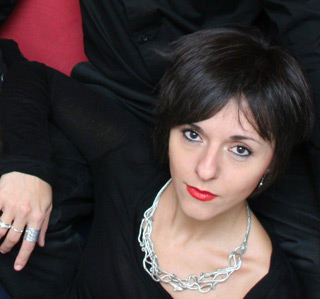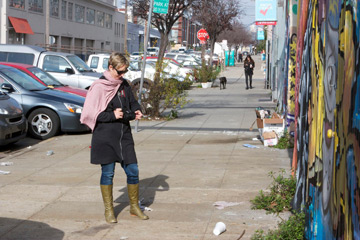Performing Anthropology
Here are plates with no appetite.
And wedding rings, but the requited love
has been gone now for some three hundred years.
Here’s a fan – where is the maiden’s blush?
Here are swords – where is the ire?
Nor will the lute sound at the twilight hour.
Since eternity was out of stock,
ten thousand aging things have been amassed instead. (…)
The crown has outlasted the head.
The hand has lost out to the glove.
The right shoe has defeated the foot.
As for me, I am still alive, you see.
The battle with my dress still rages on.
It struggles, foolish thing, so stubbornly!
Determined to keep living when I’m gone!
Wislawa Szimborska, Museum, 1962
How, and on which premisses can we imagine a “post-colonial museum” or an “affective archive”? This contemporary entanglement will be explored through an analysis of the relationship between anthropology and contemporary arts, since the experience of Ethnographic Surrealism in the 1930’s and through the idea of “the artist as ethnographer” (Hal Foster). Rethinking the current relationship between anthropology and contemporary arts from different points of view, we will take into account artworks, performances, curatorial processes in contemporary art exhibitions and/or ethnographic museums, actions inside and outside the museum, experimentations on the construction of othered archives (affective or diasporic archives). The aim is to unmask the assumptions beneath our cultural understanding of key concepts like museum, archive, modernity, linked to a precise and not universal ideas of time, space, identity.
How to turn a museum from a temple for the conservation of Archives, History, Nation, Cultures as essential categories, into a site where to activate dynamics, trying to transform it into a critical, radically self-reflective space? Such transformation calls for an ethical stance – the museum as a cultural form – which is, in turn, extremely useful in building imagined communities. The challenge is to experiment with new methodologies, by conceiving these communities in a transnational, intercultural and transdisciplinary way.
The module attempts to envision the idea of a post-colonial museum yet to come – which might no longer be a “museum” – as a site where the strategies and processes of memory creation are strongly affective. A site activating the bodies and agency of its spectators, beyond co-action; a porous and strongly political space, an experimental laboratory for new forms of citizenship, for a different “community to come”.
SCHEDULE
June 15th
morning
Guided tour to Cittadellarte, including the Pistoletto, Arte Povera collections and temporary exhibitions (curated by Luca Furlan)
afternoon
Workshop presentation and group presentation
Anthropology and Contemporary Art from Ethnographic Surrealism to the present (Case study: The Museum of European Normality)
Collective discussion
Participant presentations
June 16th
morning
For a contemporary ethnographic museum: strategies of displaying in relation with contemporary art (Case study: The Ethnographic Museum of Neuchâtel, analysis of two exhibitions)
afternoon
Presentation of actions inside the Ethnographic Museum Pigorini in Rome (Crossing Bodies and Impression d’Afrique)
Collective discussion
June 17th
morning
“Othered”, affective, diasporic archives: contemporary artists working on the archives of modernity (case studies presentation)
afternoon
Screening (artists videos, focus on the archives of modernity)
Collective discussion
June 18th
morning
Presentation of the work of the contemporary artist and anthropologist Fiamma Montezemolo
afternoon
Meeting with Fiamma Montezemolo
June 19th
morning
Collective discussion
Group work towards drafting a “Manifesto”, or an artistic/ curatorial/ design project focussing on the workshop’s topics
afternoon
Group projects
evening
Party
REFERENCES
The mentor will prepare a reader for participants with key texts, some of which will be discussed during the week.
Routes Agency
www.routesagency.com
web magazine roots§routes research on visual cultures
www.roots-routes.org
European Project MeLa - European Museums in an Age of Migrations
http://www.mela-project.eu
MeLa publications (free download)
http://www.mela-project.eu/publications
Arjiun Appadurai, Archive and Aspiration
http://pzwart3.wdka.hro.nl/mediawiki/images/c/ce/ArjunAppadurai_ArchiveandAspiration.pdf
MEN - Ethnographic Museum Neuchatel
http://www.men.ch/fr/accueil
Studio Azzurro
http://www.studioazzurro.com
Fiamma Montezemolo
http://www.fiammamontezemolo.com

BIOGRAPHY AND STATEMENT
Giulia Grechi holds a PhD in Theory and social research at the University La Sapienza (Rome, Italy). She was a research fellow at “L’Orientale” (Naples) since January 2015, as a member of the EU Project “MeLa - European Museums in the Age of Migrations”, where she worked on the relation between museums, curatorial practices, anthropology and contemporary art. Her research interests include cultural anthropology, cultural and post-colonial studies, museography, contemporary art, embodiment and emotions as a field of knowledge’s production. She teaches Photography – social communication at the Fine Arts School of Brera (Milan, Italy), Sociology of cultural processes at the European Institute of Design (IED) in Rome, and Cultural Antropology at the Naples Academy of Fine Arts. She is editor-in-chief of the on-line journal roots§routes – research on visual culture. She is a member of Routes Agency - Cura of contemporary arts, a team of independent curators based in Rome.

GUEST
Fiamma Montezemolo is both a Cultural Anthropologist (PhD University Orientale of Naples) and an artist (MFA San Francisco Art Institute). She has taught for many years in Mexico, Italy and USA and she is currently teaching at the California College of the Arts, San Francisco. As an established scholar in border and urban studies, she has patiently designed rigorous and long-term ethnographic-artistic interventions at the Tijuana-San Diego border. She is widely published and the author of two monographs: on Zapatismo and on Chicano/a politics of representation, as well as co-author (with Rene’ Peralta and Heriberto Yepez) of Here is Tijuana (Blackdog Publishing, London, 2006) and co-editor (with Josh Kun) of Tijuana Dreaming, Life and Art at the Global border (Duke Press, 2012). As an artist she situates her work as a critical extension and overcoming of the ethnographic turn in contemporary art. She works with various media, including installation, cartography, video, digital photography, industrial materials, performance, archival documents, and ethnography. Her art and video work has been exhibited, among other places, in New York, San Francisco, San Diego, New Orleans, Dublin, Rome, Mexico City, Tijuana, Morelia, Montreal, Montenegro, Buenos Aires, Los Angeles.
download the full documentation about the module and the mentor in PDF format
